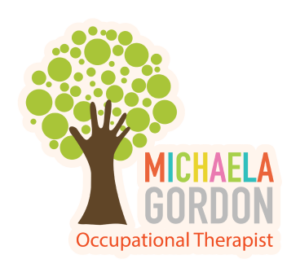Progress Through Partnership
By Michaela Gordon, OTR/L

Deciding to start occupational therapy services with your child can feel
overwhelming. It takes a great amount of trust in the therapist and the process.
We are talking about your child’s life and well-being so we must approach their
needs with the upmost of care.
We are living in a time where clients have more access to information and
therefore want more choices and more explanation. Clients will ask me about differing
opinions about certain approaches or perhaps a new gadget or therapy they saw
online. To be honest, I am also being inundated with online information and I’m
often researching what approaches and tools are effective and which are
ineffective. It is very easy to become skeptical, defensive, indecisive, and
sometimes paralyzed in a state of overwhelm with everything coming at us. It is
also very tempting to click on a quick fix or become fixated in our view points
because the algorithms in our social media feeds keep bringing up the same or
similar content. With all this information, it sometimes can distract us from
the most important part of therapy, which is the therapeutic relationship.
Humans really are interdependent. Information is great, but it really isn’t
helpful unless we know how to use it or know how to apply in a way that is
meaningful to your child.
I believe that the relationship I have with my clients is the foundation for
all the good work that is to follow. When entering into any relationship, we
must hold ourselves accountable, have empathy for each other, and work on
developing strong communication with one another. With these aspects in place,
we can effectively work together to help your child learn and grow.
Let’s explore these three aspects a little more. First is taking
responsibility for our actions. As a therapist, I’m upfront with my clients
about my responsibilities and the client’s responsibilities. Some are written
in policies and some are discussed in person. This ensures that we are all in
agreement about how we are going to contribute to the therapy process. If we
get off track, this allows us to have a discussion about the challenges occurring,
assess our plan, and then refocus back to our individual responsibilities.
Empathy is another important aspect in a partnership. As human beings, we
know that life can bring us both joy and challenges. Our goal is to try to be
fully present and on top of our responsibilities so we can make good gains in
therapy. However, there are going to be times where that doesn’t happen and we
must show empathy towards one another. As the therapist, I might make a mistake
in a report or forgot to send out an email out. Perhaps I misunderstood something
you said and took a situation in the wrong direction. These things will happen
from time to time. As the client, maybe you really want to get your home
program going, but you realize you don’t have a strong support system to do
that. Maybe you really want to work on setting a different boundary with your
child, but you are tired from a long day at work and you don’t feel you have
the energy to deal with a meltdown. None of us want to be dealing with
tribulations, but they are indeed part of life. So, whether big or small, we
need to have patience and be understanding with one another. It’s important to
take accountability when we miss the mark, but it’s equally important to know
our strengths and limitations so we can come up with a reasonable plan that we
can all follow.
Lastly, partnership requires good communication. Effective communication
includes accountability. We need to check in with how things are going and make
sure we are working toward our goals. Empathy is also part of good communication.
The words we choose and the tone we use to deliver those words, sets the stage for
how strong our therapeutic relationship will be. Bringing accountability and
empathy into our communication allows us to speak with honesty about our needs
so we can be the best support team for your child.
A partnership is an investment. It is an exchange of effort and belief in
one another. It is a chance to reconfigure life’s challenges into something
fruitful. It is about both you the parent and your child leaving therapy
empowered with skills and confidence. It keeps me motivated to study and learn
new things to bring to the therapeutic experience. A strong partnership leaves
me more experienced, wise, and skilled so I can help the next family with the same
level of passion.
So, let’s be good models for our children. Let us get away from divide and disconnect
and choose connection and collaboration. Let us show them good boundaries and how
to be accountable. Let us show them how we can be empathetic towards each
other. Let us show them how we listen to each other and that we are responsive to each others’ needs through
our actions. These skills can not only be learned in their therapy sessions,
but through our simple interactions.
Michaela E. Gordon, OTR/L
